

Medical Device Surveillance System in Spain. The prime objective of the Health Products Surveillance System in Spain is to ensure that every adverse event related to a medical device is reported on time.
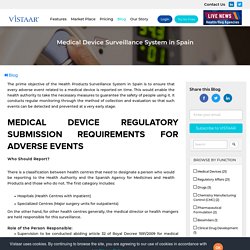
This would enable the health authority to take the necessary measures to guarantee the safety of people using it. It conducts regular monitoring through the method of collection and evaluation so that such events can be detected and prevented at a very early stage. Clinical Trials Intelligence Software. A single comprehensive regulatory requirements database.

Regulatory requirements reports enable Pharma, Biotech, Consumer Health and Medical device companies understand and efficiently manage the demanding complexity of the varied regulatory requirements to plan/manage their products in various markets. These are a big time-saver for you. The module features extensive information on all aspects (pre R&D to Life Cycle data) of Drugs, Biologics, Generics, Medical devices & Diagnostics Features: Regulatory Intelligence Software for Drugs & Devices. A single comprehensive regulatory requirements database.
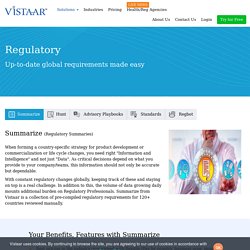
Regulatory requirements reports enable Pharma, Biotech, Consumer Health and Medical device companies understand and efficiently manage the demanding complexity of the varied regulatory requirements to plan/manage their products in various markets. These are a big time-saver for you. The module features extensive information on all aspects (pre R&D to Life Cycle data) of Drugs, Biologics, Generics, Medical devices & Diagnostics Features: Clear & Concise Our unique Regulatory Intelligence platform uses advanced technology to provide dependable information that cuts through the complexity and sheer volume of content within the regulatory compliance environment. ANSM’s Enhanced Pharmacovigilance Service in the Wake of COVID-19. ANSM has established a monitoring system specific to COVID-19, which is vigilant in reporting drug adverse events.
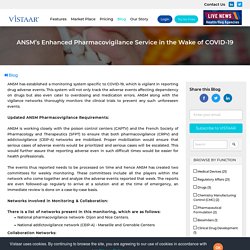
This system will not only track the adverse events affecting dependency on drugs but also even cater to overdosing and medication errors. ANSM along with the vigilance networks thoroughly monitors the clinical trials to prevent any such unforeseen events. Updated ANSM Pharmacovigilance Requirements: ANSM is working closely with the poison control centers (CAPTV) and the French Society of Pharmacology and Therapeutics (SFPT) to ensure that both pharmacovigilance (CRPV) and addictovigilance (CEIP-A) networks are mobilized.
Proper mobilization would ensure that serious cases of adverse events would be prioritized and serious cases will be escalated. The events thus reported needs to be processed on time and hence ANSM has created two committees for weekly monitoring. Danish Healthcare System Supporting Technology-Driven Medical Devices. Technology has led to advancement in the healthcare sector in the form of telemedicine, apps, wearable devices, and even artificial intelligence popularly known as AI.
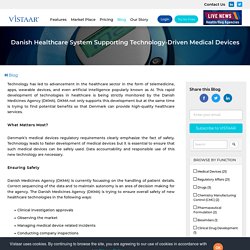
This rapid development of technologies in healthcare is being strictly monitored by the Danish Medicines Agency (DKMA). DKMA not only supports this development but at the same time is trying to find potential benefits so that Denmark can provide high-quality healthcare services. Danish Healthcare System Supporting Technology-Driven Medical Devices. VISTAAR is empowering Biopharma & Device teams with Product & Label Intel modules. Global Clinical & Regulatory Intelligence Software PRINCETON, N.J.
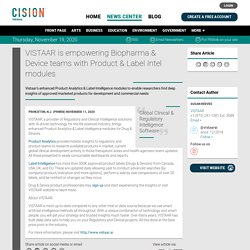
(PRWEB) November 11, 2020 VISTAAR, a provider of Regulatory and Clinical Intelligence solutions with AI driven technology for the life sciences industry, brings enhanced Product Analytics & Label Intelligence modules for Drug & Devices. Product Analytics provides holistic insights to regulatory and product teams to research available products in market, current global clinical development activity in those therapeutic areas and health agencies recent updates. Brazil’s Medical Device Submission Guidelines. Brazil has over the years modernized the market accession process.
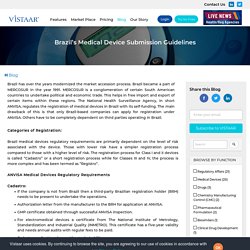
Brazil became a part of MERCOSUR in the year 1991. MERCOSUR is a conglomeration of certain South American countries to undertake political and economic trade. This helps in free import and export of certain items within these regions. FDA Guidelines to Conduct Clinical Trials during Pandemic. Clinical Trials in every country has been faced with a serious challenge in the wake of this pandemic.There are certain set protocols that need to be met while conducting a Clinical Trial, FDA clinical Requirements too are well defined but in this current situation meeting these requirements is next to impossible.
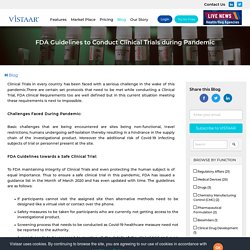
Challenges Faced During Pandemic: Basic challenges that are being encountered are sites being non-functional, travel restrictions, humans undergoing self-isolation thereby resulting in a hindrance in the supply chain of the investigational product. Moreover the additional risk of Covid-19 infecting subjects of trial or personnel present at the site. FDA Guidelines towards a Safe Clinical Trial: Canada Non-prescription Drug Label Requirements. Health Canada strictly mentions that sellers and manufacturers of non-prescription drugs should mention all the details on product labels so that Canadian citizens can make their decisions accordingly.
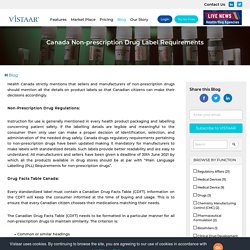
Non-Prescription Drug Regulations: Instruction for use is generally mentioned in every health product packaging and labelling concerning patient safety. If the labelling details are legible and meaningful to the consumer then only user can make a proper decision of identification, selection, and administration of the needed drug safely. Canada drugs regulatory requirements pertaining to non-prescription drugs have been updated making it mandatory for manufacturers to make labels with standardized details. Such labels provide better readability and are easy to understand. Drug Facts Table Canada: Clinical & Regulatory Compliance Intelligence Software. Understanding the USA FDA Unique Device Identification (UDI) Regulations, USA FDA Regulations, FDA as a measure to minutely identify all medical devices present in the USA market presented the unique device identification (UDI) system.
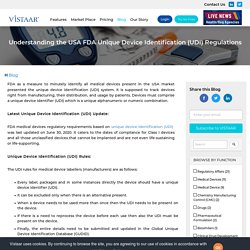
It is supposed to track devices right from manufacturing, their distribution, and usage by patients. Devices must comprise a unique device identifier (UDI) which is a unique alphanumeric or numeric combination. Pharma, Biotech, Medical Devices & Diagnostics Regulatory News. Importing Drugs from Canada Made Easier by HHS Norms. Canada’s Department of Health and Human Services has recently brought in some rules that would allow direct import of drugs from Canada thereby reducing their prices. There has even been an announcement from the administration that elaborates some procedures that drug manufacturers need to follow. Necessity of Harmonizing Medical Device Regulations in Asia. In the years, ahead Asia might see a surge in the growth of medical device industry. Globally there has been a rise in the export of product and technologies from Asia. Diversity within this continent poses a great challenge towards creating a harmonized regulation for medical devices.
Regulatory reforms are necessary as they offer room for innovation and increases efficiency. Simultaneous cost reductions have a positive impact on the national economy and keeps the competition alive allowing the companies to adapt with the changes. Once undertaken, a regulatory reform can aid in bringing about several other reform policies apt for the nation. Efforts of International Organizations: HSA (Health Sciences Authority) IVD Labelling Guidelines - Singapore. Health Sciences Authority (HSA) Singapore has a set of guidelines that needs to be followed while manufacturing or selling any health related products. Recently HSA has updated its guidelines pertaining to In-vitro Diagnostic (IVD) medical devices. Firstly, such medical devices should indicate that they serve IVD purposes.
Then all the other major indications need to be present on the label as per the existing guidelines. Drug-Regulatory-updates-september-vol2. Medical Devices - Regulatoy Updates - September 2020 - Vol 1. 1. Dutch Health and Youth Care Inspectorate (IGJ): As of 1 September, all medical devices must again have a CE marking As of 1 September 2020, all medical devices used by care providers must have a CE marking. Since mid-March, due to shortages caused by the corona pandemic, the Dutch Health and Youth Care Inspectorate (IGJ) has temporarily allowed the use of alternative medical devices without a CE marking in case of emergencies. As of 1 September, that will no longer be the case. For the time being, an exception will be made for surgical face masks, gloves, and requisites for corona tests. Medical Devices Gaining Popularity in Home Based Care.
As the world passes through a tough situation, things in the life science industry too undergo a change. To increase the capacity of hospitals, patients with mild ailments are being released. Though these patients still need care and this has urged the caregivers to move a step ahead and engage themselves in providing home based care. Using all such medical devices might lead to severe complexity but technology tends to ease the procedure thereby creating an environment even in the non-clinical sphere. FDA’s Role in Remote Monitoring: Amidst this pandemic, FDA is putting strict efforts to protect the masses from diseases and infections.
The Difference between Biosimilars and Interchangeable Products. Therapeutic products are widening up its branches and the one within it that has drawn immense attention are biological products. Doctors and healthcare providers tend to prescribe patients with biological products in the current scenario. It is here that biosimilar and interchangeable products play a crucial role. Such products open the scope of varied options in treatment process. Additionally, being similar products, they help in lowering the cost of treatment. Brazil Regulatory Authority - ANVISA – Regulatory Challenges. The Brazilian Health Surveillance Agency, commonly known as ANVISA, abbreviated from Portuguese “Agencia Nacional de Vigilancia Sanitaria,” is the food and drug regulatory agency in Brazil. In the federal public regulatory structure, the agency is connected to the Ministry of Health. Understanding FDA Regulatory Requirements for Investigational New Drug.
Development of a new drug begins when the drug's sponsor (usually the manufacturer or potential marketer), having screened the new molecule for pharmacological activity and acute toxicity potential in animals, wants to test its diagnostic or therapeutic potential in humans. Investigational New Drug types: An Investigator IND is submitted by a physician who both initiates and conducts an investigation, and under whose immediate direction the investigational drug is administered or dispensed. EUA Regulations for Medical Device Manufacturers under COVID-19 Emergency. The current pandemic demands for emergency use authorizations (EUA) so that the necessary medical items can be made available to the public with no further delays.
Post Approval Regulatory Activities in Pharmaceuticals. Applicants frequently perform studies after the FDA approves a product for marketing. The studies are used to gather additional information about product safety, efficacy, or optimal use.